Adeona is the first Open Source system for tracking the location of your lost or stolen laptop that does not rely on a proprietary, central service. This means that you can install Adeona on your laptop and go — there’s no need to rely on a single third party. What’s more, Adeona addresses a critical privacy goal different from existing commercial offerings. It is privacy-preserving. This means that no one besides the owner (or an agent of the owner’s choosing) can use Adeona to track a laptop. Unlike other systems, users of Adeona can rest assured that no one can abuse the system in order to track where they use their laptop.
I’ve slapped this on all my laptops. Why not?
People who get it… in El Lay
Here’s a pattern I’ve seen in California, Italy, France, Australia, Germany, the U.S., Brazil, Australia, and Spain. People far from the equator think themselves refined, cultured, and responsible; they consider their neighbors closer to the equator slow, shiftless, and overly emotional peasants and farmers. Those peasants consider their compatriots distant from the equator cold, dull, uncreative, and uptight business types.
I’m a Northern Californian. Generally, I have about as much respect for Los Angeles as a Bostonian has for, say, Biloxi, Mississippi. Hence, it’s a shock to the system to re-discover that the world’s not so simple, and the stereotypes don’t map to reality. Uta and I just got back from two days of non-stop culture immersion in El Lay.
A few snapshots from a great two days:

View from our table at Cafe Pinot

Wild mushroom risotto with white truffle shavings


Le saumon, monkfish on cauliflower reduction
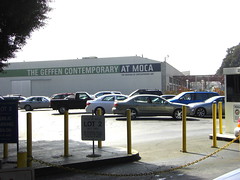
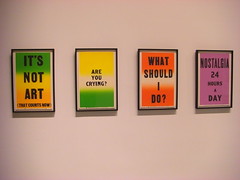
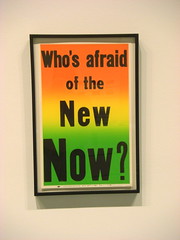
Frank Gehry did this conversion from a police-car storage facility before tackling the Gugenheim in Bilbao.
The more things change….
September 19th, 2008 — Just Jay
Over lunch today, Lance Dublin and I talked about what’s important in learning. It’s the same as ever — this point is to do things better. Everything else is window dressing.
Who’s your banker?
September 13th, 2008 — Just Jay
For the better part of the 1980s and 1990s, I was chief marketing officer of a company that developed training programs for banks. We were quite successful, counting most of the English-speaking banks you have ever heard of among our customers. To kick off the introduction of our first CD-ROM based program on relationship management (= sales), I created this video of interviews with people on the streets of Berkeley and Mill Valley, asking them “Who’s your banker?”
Personally, I deal with three banks now. I might be better keeping my money under the mattress.
- One of the banks was fined $10 million for unethical dealings with fraudulent telemarketers, misrepresented the quality and risk of $8.5 billion worth of auction rate securities, and was caught laundering money from Mexican and Colombian drug traders.
- The bank where I do my checking has made such bad lending decisions that it’s stock has lost 92% of its value in the past year.
- The bank that issues my credit cards is always up to something weird: today I got a dunning notice because I owe them $0.00. I’ve asked them to stop emailing me because one in five emails is a phishing scam. They refuse, citing their right to email me if they choose. Their website does not offer a way to get in touch with their chief compliance officer.
The lesson from the twelve-year old video remains relevant to this day: banks need to remember their job is to help people, not to seek profits from shady practices and questionable financial engineering.
Caution: this site is severly broken
September 11th, 2008
 When I upgraded the software that runs this blog (WordPress) a few days ago, something went haywire. Many previous posts are inaccessible. All I can do is wait for my service provider to reverse whatever they did to break the links. Most of my blogging will take place on the Informal Learning Blog until things here get back to normal.
When I upgraded the software that runs this blog (WordPress) a few days ago, something went haywire. Many previous posts are inaccessible. All I can do is wait for my service provider to reverse whatever they did to break the links. Most of my blogging will take place on the Informal Learning Blog until things here get back to normal.
Knowledge + zest for life
September 9th, 2008
Richard Ogle, author of the wonderful book Smart World, offers this marvellous 1927 quote from Alfred North Whitehead’s Universities and their Function. I found it apt since I am enrolled in a unversity course
for the first time in a decade.
“The justification for a university is that it preserves the connexion between knowledge and the zest for life, by uniting the young and the old in the imaginative consideration of learning. The university imparts information, but it imparts it imaginatively. At least, this is the function which it should perform for society. A university which fails in this respect has no reason for existence. This atmosphere of excitement, arising from imaginative consideration, transforms knowledge. A fact is no longer a bare fact: it is invested with all its possibilities. It is no longer a burden on the memory: it is energizing as the poet of our dreams, and as the architect of our purposes.
Thus the proper function of a university is the imaginative acquisition of knowledge…. A university is imaginative or it is nothing—at least nothing useful.
Imagination is a contagious disease. It cannot be measured by the yard, or weighed by the pound, and then delivered to the students by members of the faculty. It can only be communicated by a faculty whose members themselves wear their learning with imagination. In saying this, I am only repeating one of the oldest of observations. More than two thousand years ago the ancients symbolised learning by a torch passing from hand to hand down the generations. That lighted torch is the imagination of which I speak. The whole art in the organisation of a university is the provision of a faculty whose learning is lighted up with imagination. This is the problem of problems in university education; and unless we are careful the recent vast extension of universities in number of students and in variety of activities…will fail in producing its proper results, by the mishandling of this problem.”
To-learn list?
September 8th, 2008
A to-learn list is like a curriculum. It presupposes foreknowledge of what we need to know. The faster our world changes, the more often we will face with novel situations. We don’t know what we’ll need to know. Hence, we’d better get good at meta-learning: learning to learn. Beyond that, the democratization of work requires that we be not only our own teachers, but our own instructional designers.
I have dozens of to-learn lists. Most of them are tucked away in journals and will never again see the light of day. File ‘em and forget ‘em. Lists are handy for recording one’s reflections at a point in time, but they constrain dealing with life as it comes.
Serendipity is my greatest teacher. My calling is to help people in organizations perform more effectively and lead more fulfilling lives. What guides me is not so much ticking off items on a to-learn list as becoming more proficient at what I do. Sticking to a list might keep me from delving into vital areas I am not currently aware of.
As a knowledge worker, learning is my work. I applaud any effort to improve the process of learning. Listing learning objective is not my style but perhaps it works for you. If you maintain a list, I suggest you keep it open-ended.
Unlearning is another matter. To make room for new concepts, I watch out for vestiges of outmoded industrial-age thinking. My unlearn-list features organizational secrecy, control of people, hoarding, specialization, “hard numbers,” and similar fare.
Incidentally, I always learn from reading the multiple perspectives of people answering The Big Question. Thanks for being the catalyst on this one, Tony.
“Live” chat
September 2nd, 2008
I’m a big fan of live chat. It’s a great way to share information within an organization and can accelerate learning. It can be a great customer service, too. When it works.
 jay cross: Okay. I give up. I have wasted 30 minutes trying to rent a car from you guys. Don’t enter anything. I will find a car elsewhere.
jay cross: Okay. I give up. I have wasted 30 minutes trying to rent a car from you guys. Don’t enter anything. I will find a car elsewhere.
 Kathy R: we are not reservations; we are the Support Department; we test the error message
Kathy R: we are not reservations; we are the Support Department; we test the error message
 jay cross: So what did your test find?
jay cross: So what did your test find?
 Kathy R: Otherwise you can call reservationsThe Reservations phone number is 1-800-654-3131.
Kathy R: Otherwise you can call reservationsThe Reservations phone number is 1-800-654-3131.
 Kathy R: and they can book the car rental for you; they maybe busy as well and you may have to hold
Kathy R: and they can book the car rental for you; they maybe busy as well and you may have to hold
 Kathy R: So, are you continue to hold on the chat session ; until we test the see if we get the error message or are you calling reservations?
Kathy R: So, are you continue to hold on the chat session ; until we test the see if we get the error message or are you calling reservations?
 jay cross: I thought the purpose of Customer Support was to support customers. Guess not.
jay cross: I thought the purpose of Customer Support was to support customers. Guess not.
 jay cross: I think I will rent a car from someone else.
jay cross: I think I will rent a car from someone else. 

Google releases open source browser
September 1st, 2008
Hear that? It’s the web world being turned upside down. The online learner’s favorite tool of all time, Firefox, will never look the same. Google just brought out an open source browser. Actually, it will be out in twelve minutes.
Google Chrome leverages Google’s knowledge of page popularity, mal sights, pfishers, and so on, but the new browser sounds like it breaks new ground in flexibility, speed, and robustness. Not that I know from experience. Google enlisted the wonderful Scott McCloud to pen a elaborate cartoon that digs into the details. Don’t look at the cartoon unless you’ve got 30 minutes devote to soaking in McCloud’s amazing visual display; it conveys some very technical material in a most captivating way.
Notice to Personal Learning Portfolio theorists: Chrome may be your ticket.
I’ve got to go get my copy. See ya.
Once You’re Lucky, Twice You’re Good
August 31st, 2008
Sarah Lacy’’s Once You’re Lucky, Twice You’re Good: The Rebirth of Silicon Valley and the Rise of Web 2.0 hi-jacked my brain for the last week. After her presentation at Gnomedex, I told her how impressed I was with her technique: abandoning the stage to wander confidently through the audience talking and interviewing. (I’ve been too sheepish about this myself). Sarah gave me a copy of her new book.
Once You’re Lucky describes the re-incarnation of the web in Silicon Valley through the inside stories of the entrepreneurs behind PayPal, LinkedIn, Digg, Six Apart, Facebook, Yelp, Twitter, and others. The drama of PayPal founder Max Levchin reads like a novel, and a good novel at that. A former Business Week reporter, Sarah manages to stuff in cautionary tales of venture capital, the start-up cycle, and the rise of friend-tors.
She contrasts the web 2.0 wave to its dot-com predecessor. Today’s successes are social networks built for one’s friends that just happened to prove viable as companies. The users provide the content; there’s no inventory and no staff creating content. Marketing is viral. Often there’s no physical office. This new web is about connecting with people and sharing things with them, things like video, news clips, restaurant reviews, photos, blogs. “Every single one of these sites is about meeting people, staying in touch, or witnessing people’s own personal quirky forms of self-expression.” This is a different deal than web 1.0; in fact, the pall of the dot-com crash still tempers the exuberance of today’s web 2.0 millionaires.
The bursting of the bubble was a psychological disaster. Outsiders thought it had all been a scam. The new economy was hype. Six years later, people’s crap detectors were still too finely tuned to buy into a new vision with abandon.
In the midst of the bubble, I remember hearing a wag on the stage at PARC answer a question with, “Tulips.com.” Sarah brings up Tulipmania, a book that debunks the seventeenth-century tulip trading stories as urban legend. It wasn’t really so bad.
Nor was the dot-com bust the total disaster people remember in hindsight. Half the businesses founded in 1999 were still around five years later. That’s better odds than opening a restaurant.
I agree with Sarah’s take on why the current movement has staying power. In fact, I think this applies to the culture inside and among business organizations as well as among netizens.
Some people believe the more we socialize online, the bigger the rift in the real-world social fabric. That interacting with each other via machines makes us all more antisocial. Nothing could be further from the truth. The Web isn’t a replacement for offline relationships; it’s merely an efficient tool to keep in touch with people more easily, reconnect with friends and family once lost, or discover new friends that you may never meet in the real world. There are no online or offline friends; friends are friends.
Does your telephone separate you from friends or bring you closer? Well, the same holds true for the net.

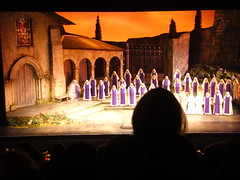

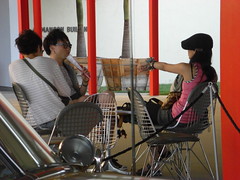


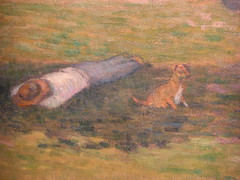













No comments:
Post a Comment